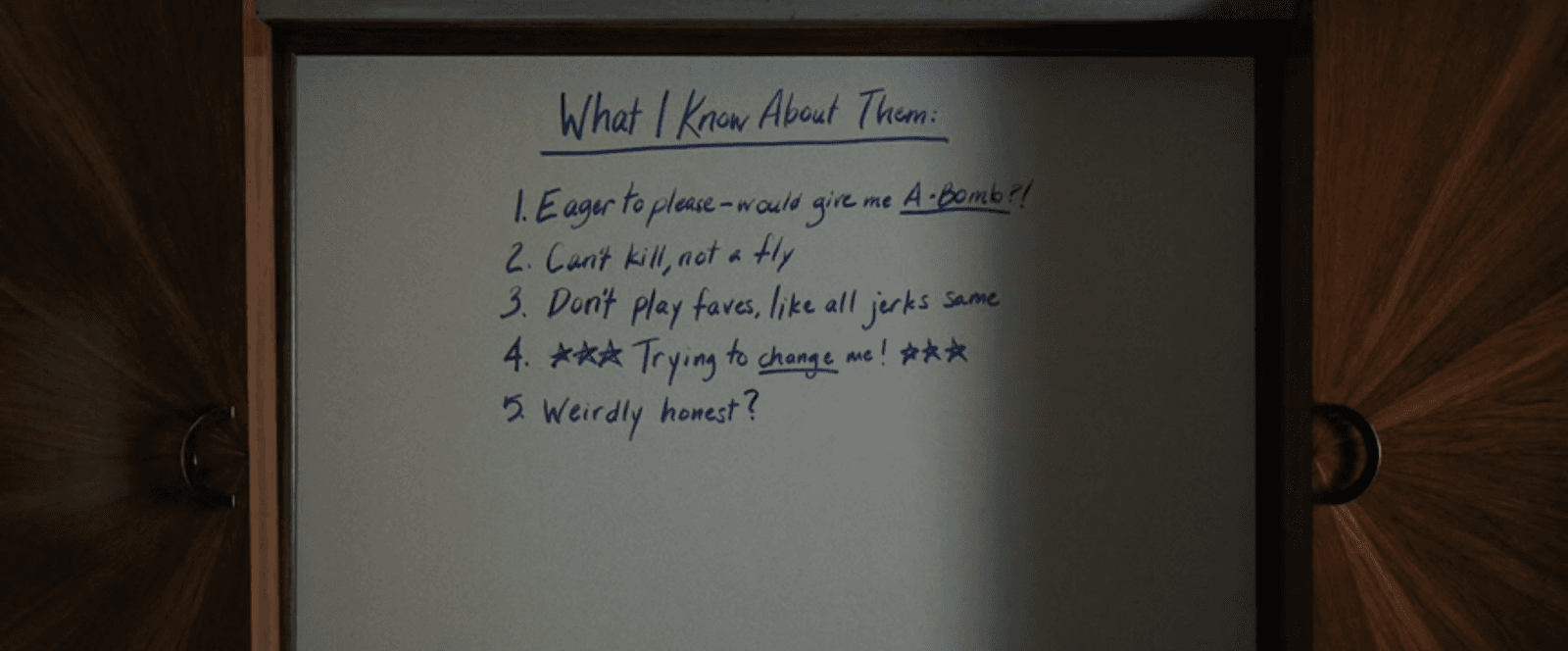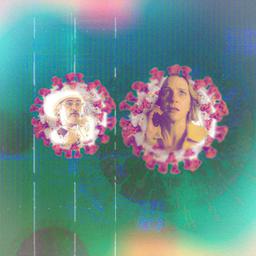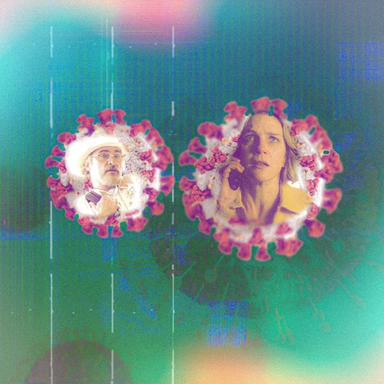
In the months leading up to the release of Pluribus, the latest TV offering from Breaking Bad creator Vince Gilligan, the show’s premise was shrouded in secrecy. Beyond the involvement of Better Call Saul standout Rhea Seehorn in a starring role vaguely described as “the most miserable person on Earth” who “must save the world from happiness,” details surrounding the series were scarce. In late July, Apple TV announced the show’s premiere date with a 30-second video that featured a woman in pink scrubs licking doughnuts and placing them back in a box labeled “Help yourself,” with a smiley face. Subsequent teasers were similarly cryptic.
Now, Pluribus and its plot have been unveiled—yet through four episodes, its world remains full of mysteries. In a thrilling series premiere, Carol (Seehorn)—a discontented bestselling fantasy romance author—survives the outbreak of an extraterrestrial virus that has infected all of humanity, save for Carol and a dozen others. The infection transforms the world’s population into a collective consciousness, eradicating human individuality in the process. And although Carol and those like her are immune to this alien virus for now, the hivemind has assured our ill-tempered hero that they are doing everything they can to allow these 13 outliers to join their blissful collective.
More than three years after the end of the Emmy-nominated six-season run of Better Call Saul, Gilligan—who got his break as a writer on The X-Files—returns to his roots in science fiction. Gilligan trickled a bit of mystery into Breaking Bad and its spinoff series, often by showing glimpses of future events before the images’ meaning could resonate, but Pluribus is a true journey back into the unknown. With the series approaching the halfway point of its nine-episode first season this past week, let’s take stock of what we’ve learned about some of the biggest questions at the center of Pluribus.
Who—or what—sent this world-altering radio signal to Earth?
It feels appropriate to begin this exercise by following Carol’s lead as she investigates the source of the planet’s recent transformation—and how to undo it. In Episode 4, “Please, Carol,” the novelist renews her solitary efforts to save the world by starting where any good brainstorming session begins: a whiteboard.

Through trial and (sometimes fatal) error, Carol has identified these five facts about the Others. And after an uncomfortable conversation between Carol and the hivemind that reveals Helen’s (Miriam Shor)—Carol’s late partner’s—honest thoughts about Carol’s unpublished novel, Carol adds a crucial amendment to her fifth observation: “Can’t lie.” If you’re able to overlook the, you know, 886,477,591 people who died during the so-called Joining, the Others have a staunch moral code and value all life equally. But at least as far as Carol and a certain man from Paraguay—more on him later—are concerned, their goal of absorbing the 13 outliers into their collective has sinister implications that could spell the end of humankind as we know it.
Carol’s list is a solid place to start, but there are still a few important details that she’s failed to include. (We should cut her some slack, though; she’s had a pretty rough week.) On the night of the Joining in the series premiere, a shell-shocked Carol speaks to the hivemind through the individual formerly known as Davis Taffler and suggests that the sudden turn of events is an alien invasion. And Taffler’s response is illuminating.
“There are no aliens,” they say. “Not on this planet. We are, however, beneficiaries of extraterrestrial technology. Fourteen months ago, astronomers discovered a radio signal from 600 light-years away. There’s no telling how long it’s been repeating. Maybe throughout all of human existence.”
Taffler proceeds to explain how the signal is made up of four tones—representing guanine, uracil, adenine, and cytosine—that turned out to be a “recipe” for a nucleotide sequence. When re-created by scientists, that recipe was revealed to be akin to a virus that Taffler describes as “a psychic glue capable of binding us all together.”
Now, none of this information offers much clarity on the nature of the source of this radio signal or what the senders’ motives may be. However, it does seem to eliminate the possibility of the Invasion of the Body Snatchers–style alien takeover that it initially appeared to be. As Taffler suggested, the signal could predate all of human existence, and there’s no telling whether the extraterrestrial entity responsible for sending it is still alive or even intended its message to be sent directly to Earth in the first place.
Pluribus might never provide answers to all of the questions that it raises. What we do know is that the Others have a “biological imperative”—as pirate lady Zosia (Karolina Wydra) puts it in Episode 2 and again in Episode 4—to expand their hivemind, and it could be a matter of weeks or months until they figure out how to make that happen with the few human stragglers who remain. Which brings us to another pressing Pluribus question …
Why are Carol and the 12 others immune to the virus?
Out of all the humans on the entire planet, and even the astronauts orbiting it in space, only 13 survived the Joining with their individuality intact. The reason for these anomalies is as unknown to the hivemind as it is to Carol and her cohort, and Pluribus finds our hero in a race to undo the Joining before the mystery is solved.
Through four episodes, we’ve met more than half of these 13 unique individuals. Here’s what we know about the six people who attended Episode 2’s impromptu immunity summit in Bilbao, whom Carol chose based on their ability to communicate in English without translation help from the Others:
- Carol Sturka: Lives in Albuquerque, New Mexico. She’s the bestselling author of the Winds of Wycaro book series, but she’s dissatisfied with her work, which she views as frivolous and hollow. She lived with her business and romantic partner, Helen, until Helen died during the Joining. She has a big drinking problem and a short temper. All-around miserable person, but we love her for it.
- Koumba Diabaté (Samba Schutte): From Mauritania. Since the Joining, he’s been living his best life. He travels with his harem of beautiful women and has plans to stay at Elvis’s penthouse at the Westgate hotel in Las Vegas.
- Xiu Mei (Sharon Gee): From China. She has a husband and lives near the Beijing Zoo. She recently witnessed a liberated giraffe eating the leaves off the tree outside of her house and told it to “go away.” It didn’t listen.
- Kusimayu (Darinka Arones): From Peru. She has an aunt and cousin whom she wants to assimilate with once the hivemind finds a way.
- Otgonbayar (Amaraa Sanjid): From Mongolia. He has a daughter. Nice guy.
- Laxmi (Menik Gooneratne): From India. She has a husband, mother, and 9-year-old son named Ravi. Not a fan of Carol. (Hard to blame her after Carol inadvertently killed her grandfather by losing her temper with the Others.)
In the disastrous meeting, Carol discovers that the other five seem perfectly content with their new reality. None of them view their relatives as being lost to this cheery hivemind, and they don’t seem all that bothered by the prospect of eventually merging with them. (Kusimayu openly welcomes it.) As a result, Carol gets hammered and deems them all “traitors to the human race.”
There are six other immune individuals in the world who have yet to appear on Pluribus. After eliminating the other English speakers as potential allies, Carol asks Zosia about the remaining candidates. Here’s what we learn about them in Episode 3:
- Bora Colak: From Istanbul. A 68-year-old candy vendor. As Zosia explained, “He speaks Turkish and loves cats.”
- Ida Ayu Dewi: From Bali. A 23-year-old contortionist and dancer.
- Sidore Melis: From Sardinia. An 89-year-old retired fisherman.
- Mary Kuksie Akintola: From Maseru, Lesotho. Her family raises Basotho ponies, but she’s only 8 years old. She hasn’t decided on a profession yet.
- Abdul Kareem Alsharei: From Aden, Yemen. A 37-year-old muezzin who sings the call to prayer. Powerful tenor voice, also loves cats.
- Takeo Kitanaka: From Osaka. According to Time Out, he makes the best udon noodles in Keihanshin.
Between the language barrier and these other unjoined strangers’ collective lack of medical or scientific expertise, all hope for Carol (and humanity as it once was) seems lost. But the 13th and final known immune person, Manousos Oviedo (Carlos-Manuel Vesga), provides her with one last shot at a team-up.
Manousos manages a self-storage facility in Asunción, Paraguay, and for the first 33 hours after the Joining, the Others weren’t aware of his existence. He’s even more distrustful of the hivemind than Carol is and refuses all communication with them, which makes for a shaky introduction when Carol calls him in Episode 3 and he mistakes her for another member of the new unified world. The opening of the fourth episode properly introduces Manousos and his self-sufficient survival tactics, but there’s still much to learn about him.
On the surface, it doesn’t seem as if there are any common factors among the 13 anomalies that could explain why they’re all immune. They’re spread across the world, they exhibit a wide variety of professions and interests, and their ages range from 8 to 89 years old. So what makes them so special?
As Pluribus progresses, potentially beyond the initial two-season order that it received from Apple, this will surely be one of its central questions. The hivemind appears to be confident that it’ll eventually find out the answer so that it can provide Carol and Co. with the perfect life and coexistence that they’ve been robbed of. Until then, Carol and Manousos have their work cut out for them.
What will the Others do once they discover how to infect the remaining humans?
“Your life is your own.”
That’s what the hivemind, via Taffler, tells Carol at the end of the series premiere. Yet as Carol points out to Zosia in Episode 3, that sentiment is true only until it’s time for her to join them against her will.
“If you were walking by a lake and you saw somebody drowning, would you throw ’em a life preserver?” Zosia asks Carol in return. “Of course you would. You wouldn’t think, you wouldn’t wait, you wouldn’t try to get consensus on it. You’d just throw it.”
Every time Carol presses the issue, Zosia apologizes and cites their biological imperative to grow the hivemind. As our miserable hero has identified on her handy whiteboard, the Others are so eager to please her that they would supply her with an atomic bomb despite the obvious risks that such a gift would pose. They’re nonviolent, even when it comes to insects. So what happens when it’s time to convert Carol and she still refuses?
The series premiere showed that the virus is passed through saliva, but even after an unwelcome kiss from a doctor at the hospital, Carol remains her unhappy self. The world’s greatest scientists are busy either trying to whip up a new recipe that could infect Carol and those like her or searching for another method of breaking through their natural immunity. But sooner or later, we’ll find out just how far their biological imperative to multiply will push them to transform the human race in its totality, which will continue to be a source of suspense as Pluribus’s story unfolds.
How can Carol undo the Joining?
Our final question brings us back to where we find Carol in Episode 4, as she searches for creative solutions in her mission to unstick the psychic glue that now binds the rest of humanity. After discovering that the Others are incapable of lying, Carol decides to channel her efforts into drawing out the truth straight from the source. While visiting Zosia, who’s recovering in a hospital from the grenade incident that nearly killed her and Carol in Episode 3, Carol asks her whether there’s a way to reverse the Joining. Although Zosia doesn’t explicitly admit it, her fearful nonresponse is enough for Carol to pursue more answers.
Carol’s subsequent plan to drug Zosia with some makeshift truth serum—thiopental sodium that she nabs from the hospital—in a public location is rushed and poorly executed. Moments into her interrogation of Zosia, they’re joined by a horde of Others, and Zosia is suddenly on the brink of death for the second time in as many episodes. “Please, Carol” concludes with the Others tearfully pleading for Carol to stop and let them save Zosia, who’s suffering from cardiac arrest, before they attempt to resuscitate her as the end credits roll.
Carol doesn’t come away from this debacle with any new insights into how to undo the Joining. However, the hivemind’s swift intervention seems to be a sign that she’s onto something. It might’ve been too easy to hope that they’d simply give away the means to their downfall, but at least Carol now knows that the possibility could exist.
Almost halfway into Season 1, Carol is in a lonely fight against a peaceful yet formidable enemy that has the collective knowledge, memories, and resources of just about every living human in the world (not to mention millions of dead ones). The latest installment introduced Manousos as a like-minded survivor with the resolve to meticulously scan the radio waves for signs of life and subsist on dog food. Even if he proves to be a valuable ally to Carol, they’d still be vastly outnumbered and without the luxury of time.
As Pluribus unravels its early mysteries, new ones are sure to follow. While Carol has been steadfast in her refusal to join the many, Gilligan also invites his viewers to question her cause. “Is this actually the apocalypse, or is this a good thing in disguise?” the showrunner asked in a promo for the series.
“There’s no doubt, when the world gets taken over by zombies, that you don’t want to turn into a zombie,” Gilligan continued. “But in this show, with what happens, I hope you kind of ask yourself, ‘Maybe this isn’t so bad?’”
As Koumba argued in Episode 2, the new world is peaceful, devoid of crime, prisons, and racism. In the episodes to come, we’ll see whether this utopia is worth the cost of free will.








